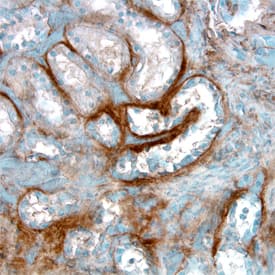Human Endostatin Antibody
R&D Systems, part of Bio-Techne | Catalog # AF1098


Key Product Details
Species Reactivity
Validated:
Cited:
Applications
Validated:
Cited:
Label
Antibody Source
Product Specifications
Immunogen
His1572-Ser1753
Accession # P39060
Specificity
Clonality
Host
Isotype
Scientific Data Images for Human Endostatin Antibody
Endostatin in Human Kidney.
Endostatin was detected in immersion fixed paraffin-embedded sections of human kidney using Goat Anti-Human Endostatin Antigen Affinity-purified Polyclonal Antibody (Catalog # AF1098) at 5 µg/mL overnight at 4 °C. Tissue was stained using the Anti-Goat HRP-DAB Cell & Tissue Staining Kit (brown; Catalog # CTS008) and counterstained with hematoxylin (blue). View our protocol for Chromogenic IHC Staining of immersion fixed paraffin-embedded Tissue Sections.Applications for Human Endostatin Antibody
Immunohistochemistry
Sample: Immersion fixed paraffin-embedded sections of human kidney
Western Blot
Sample: Recombinant Human Endostatin
Formulation, Preparation, and Storage
Purification
Reconstitution
Formulation
Shipping
Stability & Storage
- 12 months from date of receipt, -20 to -70 °C as supplied.
- 1 month, 2 to 8 °C under sterile conditions after reconstitution.
- 6 months, -20 to -70 °C under sterile conditions after reconstitution.
Background: Endostatin
Endostatin is a 20 kDa proteolytic fragment of the C-terminal, non-collagenous (NC1) domain of type XVIII Collagen. It was originally identified as a factor produced by murine hemangioendothelioma cells that could specifically inhibit endothelial cell proliferation and angiogenesis. Although the molecular signals that trigger the release of Endostatin from type XVIII Collagen are not well understood, multiple proteases have been suggested to be involved in its generation including Cathepsins S, B, L, and V, Elastase, and matrix metalloproteinases (MMPs)-2, -7, and -9. Endostatin is of particular interest as it has been shown to inhibit the growth of many primary and metastatic tumors. It may also be involved in down-regulating angiogenesis during physiological processes such as wound healing and the establishment of placental circulation. The anti-angiogenic activity of Endostatin is attributable to its ability to inhibit endothelial cell proliferation and suppress VEGF-and FGF basic-induced endothelial cell migration and adhesion. Many of these effects are thought to be mediated by interactions between Endostatin and endothelial cell-expressed Transglutaminase 2, Heparin, and Integrins alpha 5 beta 1 and alpha V beta 3.
Alternate Names
Gene Symbol
UniProt
Additional Endostatin Products
Product Documents for Human Endostatin Antibody
Product Specific Notices for Human Endostatin Antibody
For research use only